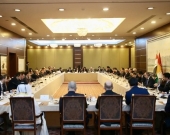Egypt lifting state of emergency and curfew

The move comes two days earlier than expected, after a court ruling.
An aide to the prime minister said the measures had ended at 14:00 GMT, but the government later said it was still waiting for the text of the ruling.
The measures were introduced on 14 August after security forces forcibly ended sit-ins in support of ousted Islamist President Mohammed Morsi.
They had been due to last a month, but the government extended them for two more months on 12 September.
New protest law
An adviser to Prime Minister Hazem el-Beblawi told the BBC that both the state of emergency and the 01:00-05:00 curfew were lifted with effect from 16:00 local time (14:00 GMT) on Tuesday.
This followed the ruling by the administrative court that said the decree extending the measures should only be effective for two calendar months.
However, a cabinet statement then said Cairo was still waiting for the text of the ruling before implementing it.
The statement also stressed that the army-backed government would abide by the verdict.
The state of emergency and the curfew allowed the authorities to make arrests without warrants and search people's homes.
Many people have also blamed the curfew for a fall in business in Cairo - at a time when the government is trying to create jobs and revive the economy.
The measures were introduced after hundreds of people died following the clearing of the pro-Morsi camps in the capital.
Mr Morsi, the country's first democratically elected president, was ousted by the army in July following widespread demonstrations against his rule.
He is currently on trial for allegedly inciting the killing of protesters outside the presidential palace in 2012.
Egyptians lived under a state of emergency - which gives extra powers to the security services - for more than three decades, until President Hosni Mubarak was forced from power amid mass protests in 2011.
Even with Thursday's moves, Egypt's military-backed government will still be keeping a tight grip, the BBC's Orla Guerin in Cairo reports.
The authorities say security forces will be deployed on main streets and in city centres across the country to tighten control, our correspondent says.
And she adds that stringent new limits on freedom of movement are expected to be introduced soon, in a law regulating public protest.
Human rights campaigners say the proposals will give police the power to ban protests outright.
A draft legislation - currently being considered by Interim President Adly Mahmud Mansour - requires protest organisers to notify police in advance of any meeting of more than 10 people, in public or in private.
BBC












